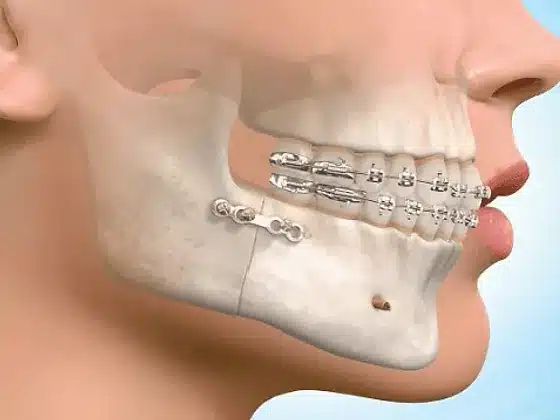Are you in need of jaw re-surgery? Look no further than maxillofacial surgeons. These highly skilled professionals possess the expertise needed to perform complex and intricate procedures involving the jaw and face. With their extensive knowledge and specialized training, maxillofacial surgeons are able to address a range of conditions and abnormalities, from correcting jaw misalignments to reconstructing facial bones after trauma.
To excel in this field, maxillofacial surgeons must possess key skills and knowledge. They must have a deep understanding of facial anatomy and biomechanics, allowing them to accurately evaluate and analyze patients’ conditions. Additionally, their expertise in surgical techniques, including bone grafting and orthognathic surgery, enables them to provide effective solutions for patients seeking jaw re-surgeries.
Moreover, maxillofacial surgeons have a comprehensive understanding of dental and oral health, ensuring that the jaw re-surgery is both functional and aesthetically pleasing. Their ability to collaborate with other specialists, such as orthodontists and prosthodontists, further enhances patient outcomes.
When choosing a maxillofacial surgeon for your jaw re-surgery, look for these essential skills and knowledge. With their expertise and dedication to patient care, they can help you achieve the results you desire.
Understanding jaw re-surgeries
Jaw re-surgeries, also known as orthognathic surgeries, are complex procedures that involve the correction of misaligned jaws or facial skeletal deformities. These surgeries aim to enhance both the functionality and aesthetics of the jaw, improving the patient’s ability to chew, speak, and breathe. Jaw misalignments can cause a range of issues, including difficulty in eating, chronic pain, and sleep apnea. Maxillofacial surgeons play a crucial role in diagnosing and treating these conditions.
To effectively perform jaw re-surgeries, maxillofacial surgeons require specialized skills and knowledge. They must have a deep understanding of the underlying causes of jaw misalignments, which can include genetic factors, trauma, or developmental abnormalities. By carefully evaluating each patient’s unique situation, maxillofacial surgeons can determine the most appropriate treatment plan.
Importance of specialized skills in maxillofacial surgery
Maxillofacial surgeons possess a unique set of skills that enable them to perform jaw re-surgeries with precision and expertise. One of the key skills they must have is a comprehensive understanding of facial anatomy and biomechanics. This knowledge allows them to accurately assess the patient’s condition and plan the surgical procedure accordingly. By considering factors such as bone structure, muscle function, and facial symmetry, maxillofacial surgeons can achieve optimal outcomes for their patients.
In addition to their understanding of facial anatomy, maxillofacial surgeons must be well-versed in a variety of surgical techniques. This includes bone grafting, which involves adding bone to the jaw to enhance its structure and stability. Orthognathic surgery, another common procedure, involves repositioning the upper and lower jaws to improve their alignment. These techniques require meticulous planning and execution, and maxillofacial surgeons are trained to handle the intricacies of these procedures.
The role of maxillofacial surgeons in jaw re-surgeries
Maxillofacial surgeons play a vital role in the success of jaw re-surgeries. Their expertise allows them to address a wide range of conditions and abnormalities, including congenital deformities, traumatic injuries, and developmental abnormalities. By working closely with other specialists, such as orthodontists and prosthodontists, maxillofacial surgeons ensure a comprehensive approach to patient care.
Before performing a jaw re-surgery, maxillofacial surgeons conduct thorough assessments to determine the underlying cause of the jaw misalignment. This may involve taking detailed images, such as X-rays or CT scans, to visualize the structure of the jaw and face. Through these assessments, maxillofacial surgeons can develop personalized treatment plans tailored to each patient’s needs.
During the surgery itself, maxillofacial surgeons utilize their specialized skills to manipulate the facial bones and reposition the jaw. This may involve cutting and reshaping the bone, using plates and screws to secure the new position, and ensuring proper alignment and stability. Throughout the process, maxillofacial surgeons prioritize patient safety and strive for optimal functional and aesthetic outcomes.
Key skills required for performing jaw re-surgeries
Performing jaw re-surgeries requires a combination of technical skills, knowledge, and expertise. Maxillofacial surgeons must possess a deep understanding of facial anatomy and biomechanics, enabling them to accurately assess the patient’s condition and plan the appropriate surgical approach. They must also be skilled in various surgical techniques, such as bone grafting and orthognathic surgery, to address specific jaw misalignments and deformities.
In addition to their technical skills, maxillofacial surgeons must have excellent communication and collaboration skills. They often work alongside other specialists, such as orthodontists and prosthodontists, to ensure a comprehensive and coordinated approach to patient care. Effective communication and collaboration are key in achieving optimal outcomes for patients undergoing jaw re-surgeries.
Furthermore, maxillofacial surgeons must possess strong problem-solving and decision-making abilities. Each patient’s case is unique, and maxillofacial surgeons must carefully evaluate and analyze their condition to determine the most suitable treatment plan. They must consider factors such as the severity of the misalignment, the patient’s age, and any underlying oral health issues. By making informed decisions, maxillofacial surgeons can ensure the best possible outcomes for their patients.
Knowledge and expertise needed for successful outcomes
Maxillofacial surgeons require a broad knowledge base and specialized expertise to achieve successful outcomes in jaw re-surgeries. They must have a thorough understanding of facial anatomy, including the structure of bones, muscles, and nerves. This knowledge allows them to accurately assess the patient’s condition and plan the surgical approach accordingly.
Moreover, maxillofacial surgeons must be well-versed in the latest advancements in surgical techniques and technologies. This includes a deep understanding of bone grafting procedures, which involve adding bone to the jaw to enhance its structure and stability. They must also stay updated on advancements in orthognathic surgery, which involves repositioning the upper and lower jaws to improve their alignment. By staying abreast of the latest developments, maxillofacial surgeons can provide their patients with the most advanced and effective treatment options.
Additionally, maxillofacial surgeons must have a comprehensive understanding of dental and oral health. The jaw is an integral part of the oral cavity, and any surgical intervention must take into account the patient’s overall oral health. This includes considering factors such as tooth alignment, occlusion, and the presence of any dental prosthetics. By ensuring that the jaw re-surgery is both functional and aesthetically pleasing, maxillofacial surgeons can enhance the overall quality of life for their patients.
Training and education for maxillofacial surgeons
Becoming a maxillofacial surgeon requires extensive training and education. After completing a bachelor’s degree in a related field, aspiring maxillofacial surgeons must attend dental school and obtain a Doctor of Dental Surgery (DDS) or Doctor of Dental Medicine (DMD) degree. Following dental school, they must complete a residency program in oral and maxillofacial surgery, which typically lasts four to six years.
During their residency, maxillofacial surgeons receive specialized training in various aspects of facial and jaw surgery. This includes hands-on experience in performing complex procedures, such as bone grafting and orthognathic surgery. They also receive training in anesthesia, pain management, and post-operative care to ensure the well-being of their patients.
In addition to their residency training, maxillofacial surgeons may pursue further specialization through fellowship programs. These programs allow them to gain expertise in specific areas, such as craniofacial surgery or temporomandibular joint (TMJ) disorders. By continuously learning and refining their skills, maxillofacial surgeons stay at the forefront of their field and provide the highest level of care to their patients.
Advanced techniques and technologies in jaw re-surgeries
Advancements in surgical techniques and technologies have greatly improved the outcomes of jaw re-surgeries. Maxillofacial surgeons now have access to a range of innovative tools and approaches that enhance the precision and effectiveness of their procedures. One such advancement is the use of computer-aided design and computer-aided manufacturing (CAD/CAM) technology. This technology allows maxillofacial surgeons to plan the surgery in a virtual environment, simulating the desired outcomes and ensuring optimal results.
In addition to CAD/CAM technology, maxillofacial surgeons may utilize 3D printing to create customized surgical guides or models. These guides help guide the surgical procedure and ensure accurate placement of bone grafts or orthognathic plates. 3D printing also allows for the creation of patient-specific implants, ensuring the best possible fit and functionality.
Furthermore, advancements in imaging technology, such as cone-beam computed tomography (CBCT), provide maxillofacial surgeons with detailed and precise images of the jaw and face. This allows for more accurate diagnosis and treatment planning, improving the overall success of jaw re-surgeries.
Collaborative approach in maxillofacial surgery teams
Maxillofacial surgery is a multidisciplinary field that often requires collaboration with other specialists. Maxillofacial surgeons work closely with orthodontists, prosthodontists, and other dental professionals to ensure comprehensive patient care. This collaborative approach allows for a more holistic and coordinated treatment plan, resulting in improved outcomes for patients undergoing jaw re-surgeries.
Orthodontists play a crucial role in the pre-operative and post-operative phases of jaw re-surgeries. They work closely with maxillofacial surgeons to align the teeth and prepare the jaw for surgery. By ensuring proper tooth alignment and occlusion, orthodontists contribute to the overall success and stability of the surgical outcomes.
Prosthodontists, on the other hand, specialize in the restoration and replacement of missing teeth. They collaborate with maxillofacial surgeons to address any dental prosthetics or implants that may be required as part of the jaw re-surgery. By working together, maxillofacial surgeons and prosthodontists ensure optimal functional and aesthetic outcomes for their patients.
Conclusion and the future of maxillofacial surgery
Maxillofacial surgeons possess the key skills and knowledge necessary to perform jaw re-surgeries with precision and expertise. Their deep understanding of facial anatomy, specialized surgical techniques, and collaborative approach with other specialists make them invaluable in the field of maxillofacial surgery.
As advancements in technology continue to emerge, the future of maxillofacial surgery looks promising. The integration of virtual planning tools, 3D printing, and advanced imaging techniques will further enhance the precision and accuracy of jaw re-surgeries. This will result in improved outcomes and a higher quality of life for patients seeking these procedures.
When choosing a maxillofacial surgeon for your jaw re-surgery, consider their experience, expertise, and commitment to patient care. By selecting a skilled and knowledgeable professional, you can rest assured that you are in capable hands. Maxillofacial surgeons are dedicated to providing the best possible outcomes for their patients, helping them achieve functional and aesthetically pleasing results.






